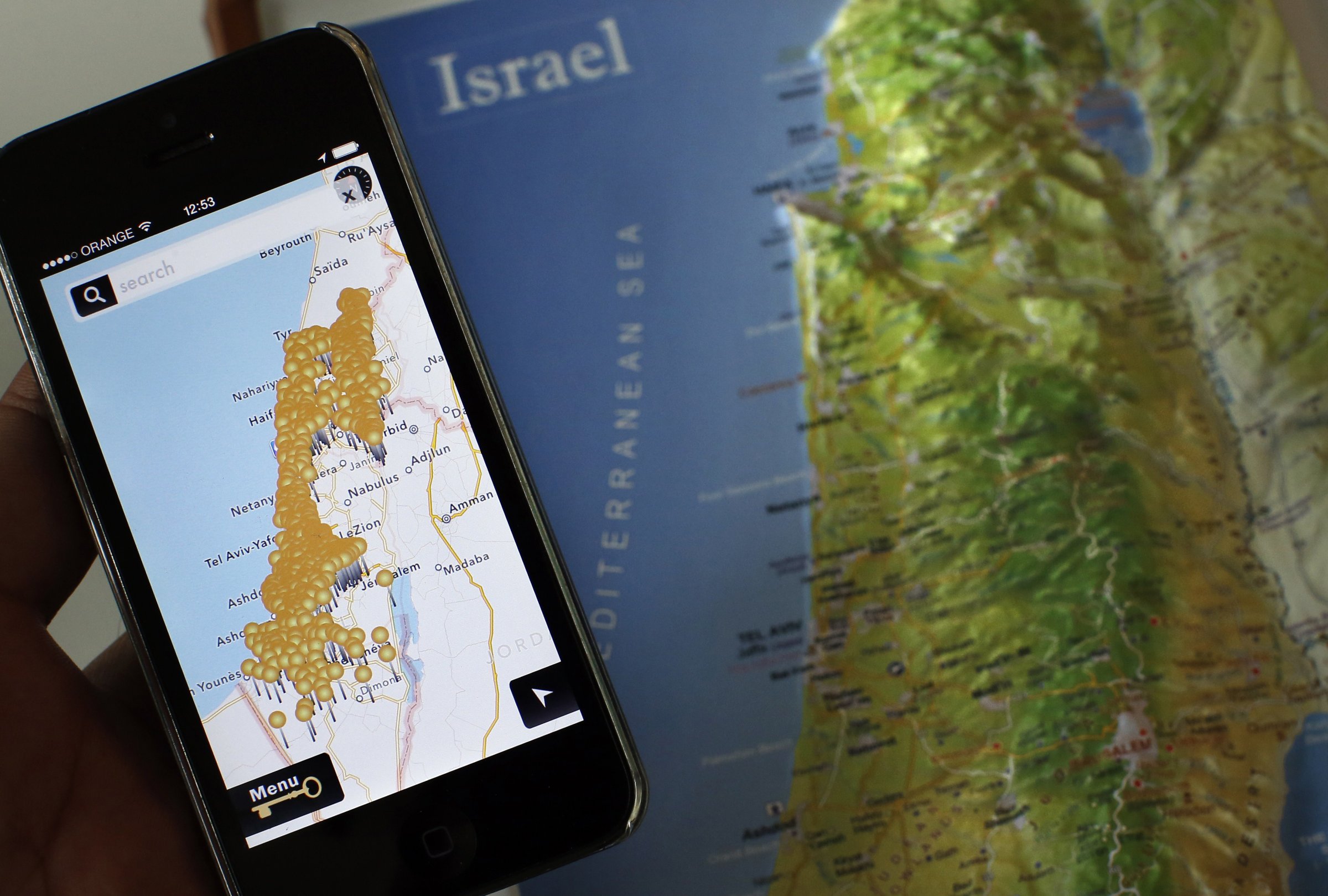
Tuesday was Independence Day in Israel, and Israelis marked 66 years of statehood with barbecues, flyovers, and fireworks. Supporters of the Palestinians used the occasion to unveil a new app that looks at the holiday from the perspective of the side that lost the 1948 war and has been locked in conflict with Israel ever since: iNakba
In Arabic, “nakba” means “catastrophe,” and the iPhone application maps some 500 Palestinian villages that once stood on the land controlled by Israel since 1948. The app was developed by Zochrot, an Israeli nongovernmental organization that exists to remind Israel’s Jewish majority of that history. “The application provides coordinates and maps of Palestinian localities that were completely demolished and obliterated after their capture, partially demolished, or remained standing although their residents were expelled,” Zochrot says on its website.
This appears, on an iPhone screen, as a forest of ochre-colored Google Map pins laid over the familiar map of modern Israel. Tap on any one pin and the Arabic name of the village comes up: Umm al-Zinat, for instance, in the north near Haifa. Tap again, and a page opens showing a photo—some feature handsome stone buildings, this one just rubble—and a few lines of data: There is the name of the Jewish communities that went up after 1948 (Elyakim), the date and the Israeli military unit that occupied it, and the Palestinian population in 1948 (1,710) and after 1948 (None).
A menu allows viewers to upload photos of their own, and offers driving directions, using Google Maps, Apple Maps or Waze—the crowd-sourcing navigation app developed by Israelis and purchased by Google for $1.15 billion.
“The idea of the app is like changing the landscape, because we in Zochrot believe that maps are a political tool, and from ‘48 till today, Israel on its maps just erased Palestine and its localities and our heritage,” Raneen Jeries, a spokesperson for Zochrot, tells TIME. “So we put Palestine back on the map.”
The app has its practical uses. Of the 3,000 downloads in the first 24 hours, some may have been by descendants of the 750,000 people who fled or were forced out in 1948 and now come to Israel looking for the site of their ancestral home in a landscape of freeways, factories and subdivisions. Bound volumes like All That Remains can help, but as Jeries says, “It’s not easy to find the destroyed places.”
But the app also represents a new frontier—clean, bright, helpful—in the competition between historical narratives. Israelis and Palestinians have different experiences of the last century, and each wants the world at large to see history from their perspective. The differences between them extend even as far as dates: Israel changes the date of Independence Day every year, marking the occasion according to the lunar-based Jewish calendar. Palestinians use May 15, the day after Israel signed its declaration of independence on the Gregorian calendar in 1948.
The iNakba effort is unlikely to change many minds among Jewish Israelis, says Dahlia Scheindlin, a political consultant and pollster who blogs on the leftist +972 site. “Up until now, Zochrot has taken very radical positions,” she tells TIME. By supporting the right of return for Palestinians—allowing descendants of the 1948 exodus to live in Israel—the group has placed itself in line with a segment of the Jewish Israeli population that, Scheindlin says, is too tiny to register in public opinion surveys. Nakba is so unpopular a notion that until the Knesset legal advisor barred its introduction in 2012, Israeli lawmakers championed a bill barring its commemoration inside Israel, even though 20 percent of the population is Arab, many descended from the Palestinians who were allowed to remain after 1948.
Still, Scheindlin says, Zochrot has displayed a talent for framing a volatile issue in new ways. “They’re making an effort to get noticed in Israeli society,” she says, “and at least talk in way that will get people thinking.”
More Must-Reads from TIME
- Cybersecurity Experts Are Sounding the Alarm on DOGE
- Meet the 2025 Women of the Year
- The Harsh Truth About Disability Inclusion
- Why Do More Young Adults Have Cancer?
- Colman Domingo Leads With Radical Love
- How to Get Better at Doing Things Alone
- Michelle Zauner Stares Down the Darkness
Contact us at letters@time.com